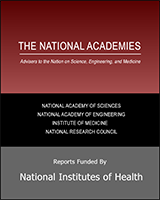NCBI Bookshelf. A service of the National Library of Medicine, National Institutes of Health.
Effectively communicating the promise of new technologies can be challenging, particularly when the science is not yet fully developed and its application is not well defined and understood. Toxicogenomics meshes toxicology with genomic technology (study of the entire expanse of genetic information in an organism) and may hold the promise of detecting changes in the expression of a person's genes if he or she is exposed to toxicants. As defined by the National Center for Toxicogenomics, toxicogenomics is the “collection, interpretation, and storage of information about gene and protein activity in order to identify toxic substances in the environment, and to help treat people at the greatest risk of diseases caused by environmental pollutants or toxicants” (NCT 2002). As the technology develops and more data become available, it is important that scientists and the public discuss the promises and limitations of this new field. The Committee on Communicating Toxicogenomics Information to Nonexperts designed a workshop to consider strategies for communicating toxicogenomics information to the public and other nonexpert audiences, specifically addressing communication issues surrounding some key social, ethical, and legal issues related to toxicogenomics and how information related to the social implications of toxicogenomics may be perceived by nonexperts. Because research on the communication of toxicogenomics to the public is sparse, panelists who are experts in risk and biotechnology communication were asked to present research from their work. They applied their expertise in analogous areas to discuss ways to design an effective strategy to communicate toxicogenomics information. Panelists discussed communication barriers, such as poor understanding of scientific principles and emotional responses to risk and uncertainty by the public, and health disparities in communication. The panelists also discussed effective communication tools, such as audience-based communication (focusing efforts on understanding the audience and creating messages based on the informational needs of that specific audience); mental models approach (assessing systematically what kinds of information should be conveyed to the public and then creating messages that meet those needs); public participation (encouraging public input and providing public access to the decision-making process); and developing, testing, and communicating of appropriate messages. They also discussed the importance of how the message is framed for the audience.
The workshop was not intended to develop consensus on the issues related to toxicogenomics communication but to provide useful background information on risk communication that may assist agencies and organizations in effectively communicating toxicogenomics information to the public.
Contents
- The National Academies
- Committee on Communicating Toxicogenomics Information to Nonexperts
- Committee on Emerging Issues and Data on Environmental Contaminants
- Board on Environmental Studies and Toxicology
- Board on Life Sciences
- Preface
- Summary of the Workshop
- OVERVIEW
- INTRODUCTION TO TOXICOGENOMICS
- RISK COMMUNICATION
- SUFFICIENCY OF INFORMATION
- CAPACITY TO ACCESS AND UNDERSTAND INFORMATION
- EMOTIONAL RESPONSES TO RISKS
- TRUST IN SCIENTIFIC AND GOVERNMENT AGENCIES AND MASS-MEDIA ORGANIZATIONS
- WRAP UP: DEVELOPING TOOLS FOR EFFECTIVE TOXICOGENOMICS COMMUNICATION
- REFERENCES
- Appendixes
This project was supported by Contract No. N01-OD-4-2139 between the National Academy of Sciences and the National Institute of Environmental Health Sciences. Any opinions, findings, conclusions, or recommendations expressed in this publication are those of the author(s) and do not necessarily reflect the view of the organizations or agencies that provided support for this project.
NOTICE: The project that is the subject of this workshop summary was approved by the Governing Board of the National Research Council, whose members are drawn from the councils of the National Academy of Sciences, the National Academy of Engineering, and the Institute of Medicine. The members of the committee responsible for the workshop summary were chosen for their special competences and with regard for appropriate balance.
This report is based on the proceedings of a workshop that was sponsored by the Forum on Microbial Threats. It is prepared in the form of a workshop summary by and in the name of the editors, with the assistance of staff and consultants, as an individually authored document. Sections of the workshop summary not specifically attributed to an individual reflect the views of the editors and not those of the Forum on Microbial Threats. The content of those sections is based on the presentations and the discussions that took place during the workshop.
- NLM CatalogRelated NLM Catalog Entries
- Review Risk management frameworks for human health and environmental risks.[J Toxicol Environ Health B Cri...]Review Risk management frameworks for human health and environmental risks.Jardine C, Hrudey S, Shortreed J, Craig L, Krewski D, Furgal C, McColl S. J Toxicol Environ Health B Crit Rev. 2003 Nov-Dec; 6(6):569-720.
- TAILORING SCIENTIFIC COMMUNICATIONS FOR AUDIENCE AND RESEARCH NARRATIVE.[Curr Protoc Essent Lab Tech. 2...]TAILORING SCIENTIFIC COMMUNICATIONS FOR AUDIENCE AND RESEARCH NARRATIVE.Hutchins JA. Curr Protoc Essent Lab Tech. 2020 Jun; 20(1). Epub 2020 Jan 24.
- Communication in a Human biomonitoring study: Focus group work, public engagement and lessons learnt in 17 European countries.[Environ Res. 2015]Communication in a Human biomonitoring study: Focus group work, public engagement and lessons learnt in 17 European countries.Exley K, Cano N, Aerts D, Biot P, Casteleyn L, Kolossa-Gehring M, Schwedler G, Castaño A, Angerer J, Koch HM, et al. Environ Res. 2015 Aug; 141:31-41. Epub 2014 Dec 12.
- Review Complementary roles for toxicologic pathology and mathematics in toxicogenomics, with special reference to data interpretation and oscillatory dynamics.[Toxicol Pathol. 2004]Review Complementary roles for toxicologic pathology and mathematics in toxicogenomics, with special reference to data interpretation and oscillatory dynamics.Morgan KT, Pino M, Crosby LM, Wang M, Elston TC, Jayyosi Z, Bonnefoi M, Boorman G. Toxicol Pathol. 2004 Mar-Apr; 32 Suppl 1:13-25.
- Review Application of Toxicogenomics to Cross-Species Extrapolation: A Report of a Workshop[ 2005]Review Application of Toxicogenomics to Cross-Species Extrapolation: A Report of a WorkshopNational Research Council (US) Committee on Applications of Toxicogenomics to Cross-Species Extrapolation. 2005
- Communicating Toxicogenomics Information to NonexpertsCommunicating Toxicogenomics Information to Nonexperts
Your browsing activity is empty.
Activity recording is turned off.
See more...
